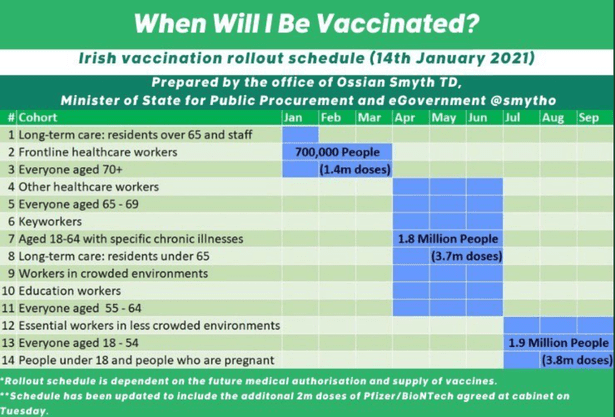Over the previous two months many different vaccines have been placed on the market, with the EU gobbling up hundreds of millions of vials from multiple different companies such as Pfizer, Oxford/AstraZeneca, and Moderna. While the elderly population and frontline hospital staff have been prioritised for vaccination, and rightly so, where do students fall into the list of vaccine recipients?
Within the Irish Government’s release of a list for vaccination offers, students will fall into four brackets: Keyworkers, Those aged 18-64 with specific chronic illness, Essential workers in less crowded environments, and ages 18-54.

Key workers
Keyworkers are those who work in essential services such as supermarkets/ food shops, pharmacies. This sector is a stronghold with students as these areas of employment cater to part-time hours, which are ideal to support students. Students who have worked through the pandemic in the keyworker sector will be the 6th group to be vaccinated, beginning in April and hopefully completed by the end of June.

18-64 With Chronic Illnesses
The population in this category would be adults who suffer from long term illnesses that Covid-19 could have a major or fatal impact on. While this grouping would be offered vaccinations within the same 3- month period as Keyworkers, they are in 7th place. This means the Adults with chronic illnesses grouping could be forced further behind in the queue if delays in receiving vaccinations take a knock-on effect.
Essential Workers In Less Crowded Environments
This category falls into those working in areas such as delivery services and other areas of retail such as clothing and home-wear. This is another area that has a strong presence of part-time student workers. These areas of work can expect to be vaccinated between July and September of 2021.

Everyone Aged 18-54
Finally, students who are not working in an essential work area, nor suffer from chronic illness will be vaccinated between July and September as well. This would be the second last group to be vaccinated ahead of under 18s. However, it is worth noting the virulence of Covid-19 could be diminished. With all vulnerable people, those who work in essential retail, and frontline staff vaccinated at this point, the hope is that the spread will be near 0.
The result of a successful roll-out would mean that Ireland would be Covid-19 free by October, in this case, in-person colleges could resume, nightlife will reopen, and the restrictions will be totally lifted. Of course, this is all on an ideal timeline, in which Minister of Health Stephen Donnelly has labelled “an aim” rather than a certainty.
Luke Murphy – Co-Editor



